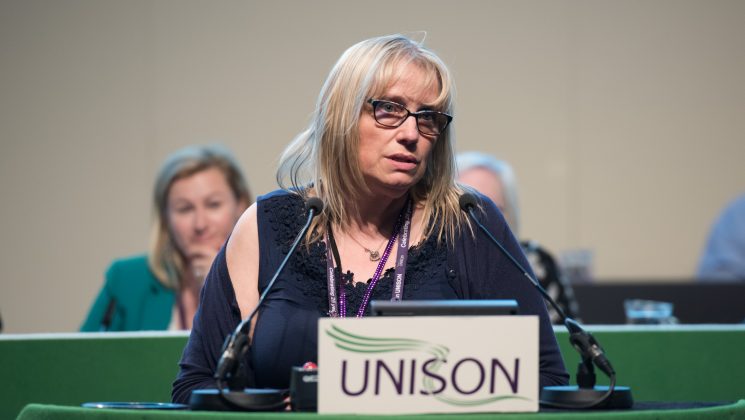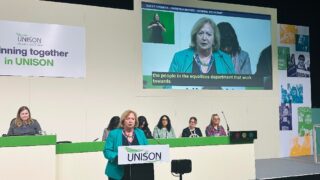Almost 50 years after the Ford machinists went on strike at Dagenham, the UK still has one of the worst gender pay gaps in Europe. Angie Roberts, of the National Executive Council (NEC) said: “We call on the government and employers to take urgent action. Reporting introduced in 2018 has exposed the true gap in gender pay. The fight for equality is far from over – in fact – the gap is getting wider.”
Wendy Trueman, from Salford city branch, said: “It is scandalous that men are still paid more than women. Whether you’re Billy ending with a ‘y’ or Billie with an ‘ie’ you should be paid the same.
“We need to be willing to hold employers to account, such as the public sector women workers have in Glasgow. Their success this year sent a strong message to employers and underpaid staff alike – that workers are stronger together.”
This £548 million deal agreed by Glasgow Council in April was a major victory for low paid women workers, most of whom work in caring, catering and cleaning across the city. The agreement represents compensation for the pay lost due to a discriminatory pay and grading system, which had been in place since 2007.
Speaking at the conference, one of the Glasgow city branch members, said: “Striking was not an easy decision, but the fight has to go on for social justice. This was a fight that had been going on for 12 years,” she said. “After talks in 2018 broke down, we knew we had to take action. It was about recognising our equal value.
“Our cause resonated with those fighting for justice well beyond Scotland’s borders. We received solidarity from trade unions around the world. This settlement and the payments some workers will receive are life-changing sums of money.”
Another speaker, from Northern Ireland, said that regulation is as important as pay settlements: “Cleaners at the Royal Victoria Hospital brought an equal value case which we won and was secured in law. But it didn’t include how pay recording would happen – and this is a problem moving forward.”
Several speakers highlighted the additional injustices faced by Black women and those with disabilities. Black women earn 14% less on average and more likely to be employed on zero hour contracts.
Catherine Kennedy added that disabled workers are paid around £3,000 a year less than non-disabled women, as well as facing significant barriers to getting a job.
The motion includes bringing together current research on the persistent and underlying reasons that contribute to the pay gap and to lobby the government to bring in measures that support women better in the workplace.
“We know women bear the brunt of caring responsibilities for older relatives and for childcare. We know that many employers only accept applicants for higher paid jobs if they work full-time. We know that women in part time jobs are being denied opportunities,” said Sarah Taylor, of Cymru/Wales branch. “It is the approach of employers to recruitment that is the problem.”
Another measure that could help is improving gender pay reporting. UNISON welcomed its introduction in April 2018, which forced organisations with 250 employees or more to publish gender pay.
However conference argued that the measure should be extended to include companies with far fewer employees. Most care agencies, which are notorious for underpaying workers – the vast majority of whom are women – are currently exempt from gender pay reporting due to their smaller size.
In Scotland, there is an expectation that organisations with 20 or more employees will provide detailed data and in Wales, companies with more than 150 employees report gender pay.
At present, Northern Ireland, has no pay gap reporting and UNISON will campaign for it to be introduced rapidly once a government is re-established.
“UNISON is well-placed to champion change. We are in a strong position to campaign and negotiate for improved policies and practices, both nationally and locally.
“Smashing the gender pay gap must be at the heart of all collective bargaining if progress is to be made,” said Ms Roberts.






